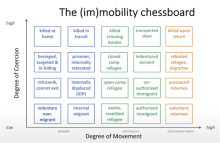Written by: Kaitlyn Laibe
Throughout her career, Professor Rawan Arar has tried to make sense of what she was constantly seeing in the news – the individualistic rhetoric around refugees, how states were framing the conversation, and exclusionary legal frameworks. The literatures on refugees, humanitarianism, and law were disjointed, but Arar could see how these issues overlapped in the real world. In this context, she, along with her colleague, David Scott FitzGerald at UCSD, began connecting these siloes of information by putting them in conversation with each other.
In 2023, their work culminated in the publication of The Refugee System: A Sociological Approach. In the book, Arar and FitzGerald explore how a global system shapes the movement of refugees. The “global” qualifier is important here, as the refugee literature often unhelpfully siloes the Global North and the Global South. But a sharp distinction between the two is detrimental to a comprehensive understanding. In an interview, Professor Arar emphasized it is impossible to understand how states work together to control, facilitate, and prevent movement on a larger scale without understanding the relationship between these two geopolitical landscapes. This global viewpoint is informed by a systems approach, in which every moving piece – no matter how historically siloed – is considered. Although the “world system” is not a new idea, it is one that Professor Arar and FitzGerald amplify throughout their book as they work to shift the way that refugee movements are traditionally understood.
In addition to emphasizing the global connectedness of the refugee system, The Refugee System moves from treating refugees solely as individuals to also considering them as part of family structures. Traditionally, studies of refugee decision-making center individuals. In the process, they neglect that individuals are often part of communal structures, like families, to which they have obligations. By shifting the focus of analysis to the family, scholars can begin to think about how the decisions refugees make about their own lives also reflect the wants and needs of their loved ones, such as how much money they will make for their family, whether children or women can travel alone, and if the destination is suitable for a family unit. Arar points out that the focus on individuals is not necessarily wrong, but it does prevent a holistic understanding of refugees’ decision-making. Like the systems approach, this focus on families fosters a more humanistic approach to the study of refugee issues.
Arar and FitzGerald’s trailblazing in the refugee literature does not end there. The Refugee System also redefines migration and refugees in a variety of diverse contexts, mapping them onto a continuum of displacement and coercion. This mapping culminates in a matrix the authors call the “(im)mobility chessboard.” The chessboard illuminates how individuals can move back and forth between categories. It also shows that the process of seeking refuge is not a static one, but one that is continually changing. (For visual graphics of the chessboard moving, watch this). In one image (the bottom left corner), “you have people living at home (like most of the world) and the chessboard puts them in conversation with people who have been killed, with people who cannot leave because the state won’t let them, and with people who have fled and then been forced to return,” Arar explained. Arar emphasizes that the point of the chessboard is not to assume there is equal distance between each box, but to understand how they relate to one another.
For anyone interested in learning more about refugee systems, Professor Arar is teaching a 150-student class in the spring (LSJ 329: “Citizenship, Migration, and Rights”), as well as a smaller seminar (LSJ 490: “Genocide and Survival”). For those interested in continuing to engage with Professors Arar and FitzGerald’s book, you can find the recorded book launch and related commentary at the United Nations University here, the book review here, and the first chapter of the book here.
